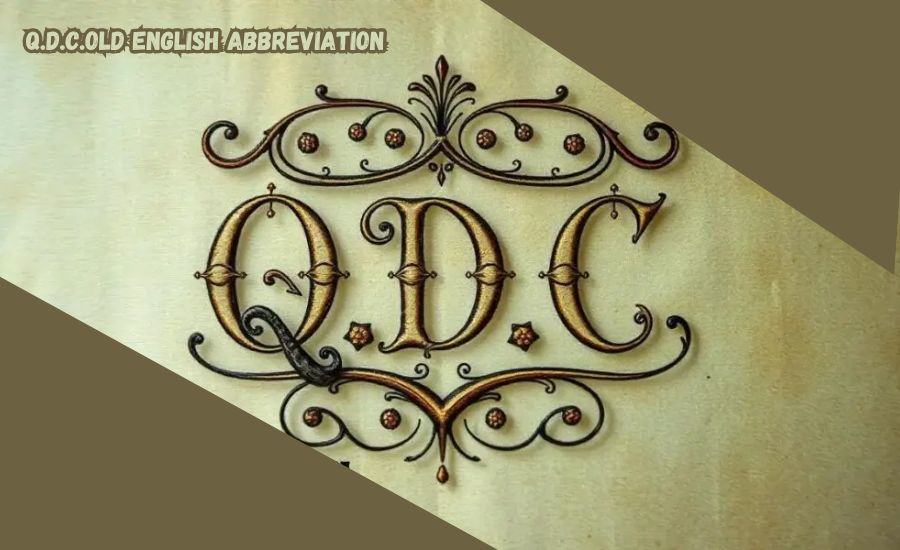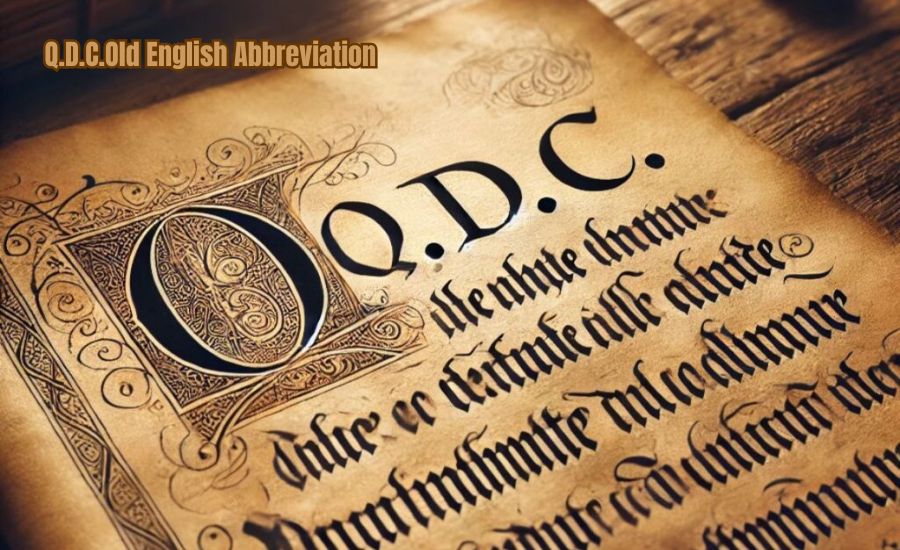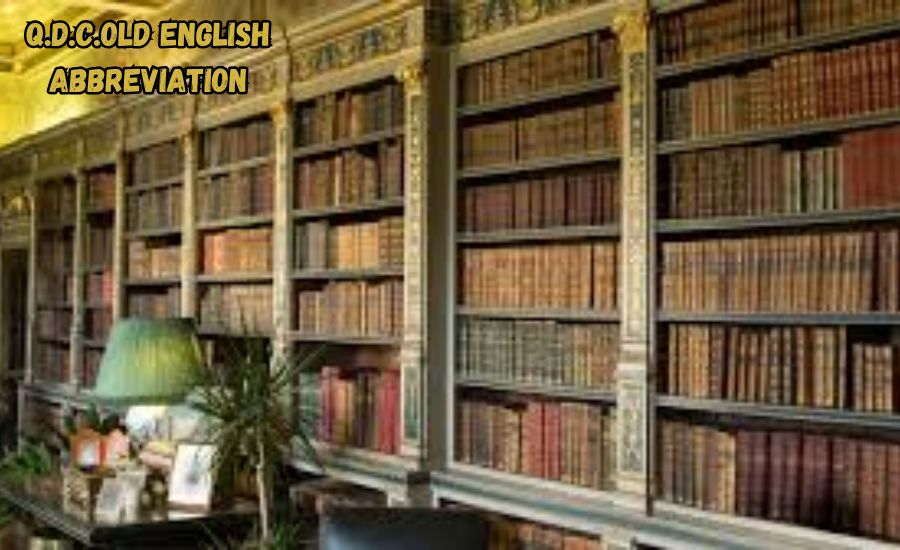Unlocking the Meaning of Q.D.C.Old English Abbreviation: A Comprehensive Guide

When exploring the fascinating world of old English texts, you may come across various abbreviations that pique your interest. One such abbreviation is “Q.D.C.” Understanding this term can unlock insights into historical documents, especially in religious and legal contexts. In this article, brought to you by USA MAGZENE, we will delve into the meaning of Q.D.C.Old English Abbreviation, its historical significance, and its applications in various documents. Whether you’re a history enthusiast, a student, or simply curious about old English, this guide will provide valuable insights into this intriguing abbreviation.
What Does “Q.D.C.” Stand For?
Understanding the Abbreviation
The abbreviation “Q.D.C.” translates to “Quod Deus Conjunxit,” a Latin phrase meaning “What God Has Joined Together.” This expression was commonly used in old English texts, especially in marriage certificates and religious writings. It signifies the belief that marriages or unions are divinely sanctioned, indicating that these partnerships should be respected and upheld.
Religious Context
In the context of old English culture, this phrase carried immense weight. It was a reminder that marriages were not merely legal contracts but sacred bonds recognized by God. This understanding is crucial when interpreting historical marriage documents, where “Q.D.C.Old English Abbreviation” often appears.
Common Usage in Documents
You might encounter “Q.D.C.” in various contexts, such as:
- Marriage Certificates: Often inscribed to indicate that the marriage was blessed by the church, reinforcing the spiritual nature of the union.
- Religious Texts: Used to signify the divine nature of certain agreements or bonds.
- Legal Documents: Occasionally found in contracts that involved partnerships deemed significant from a religious standpoint.
Understanding the origins and implications of “Q.D.C.Old English Abbreviation” provides a foundational grasp of its significance in both historical and modern contexts.
Historical Significance of “Q.D.C.Old English Abbreviation”

Marriage and the Church
The phrase “Quod Deus Conjunxit” reflects a time when the church played a central role in daily life, particularly in marriage. During medieval times, marriages were not just personal choices; they were significant societal events often conducted in the presence of religious authorities. The inclusion of “Q.D.C.Old English Abbreviation” in marriage records served as a formal declaration that the union had divine approval, symbolizing a commitment that transcended earthly agreements.
Cultural Reflection
The usage of “Q.D.C.” also reveals much about the societal norms of the time. Marriages were viewed as sacred partnerships, and the church’s endorsement was vital. This reflects a culture where spirituality intertwined with daily life, making phrases like “What God Has Joined Together” deeply significant.
Legal Implications
In legal documents, the phrase emphasized that agreements were not just human constructs but were under the watchful eye of the divine. This added a layer of seriousness and commitment to contracts, which is crucial for understanding the legal landscape of that era.
How “Q.D.C.Old English Abbreviation” Affects Modern Understanding of Old Texts
Decoding Historical Documents
Historical Contextualization
For those studying history, literature, or genealogy, knowing what “Q.D.C.Old English Abbreviation” means can significantly enhance your understanding of old English documents. It provides context to the relationships and agreements made in the past, revealing how individuals viewed their commitments.
- Historical Research: When historians come across documents with “Q.D.C.Old English Abbreviation”, it indicates a religious context that adds layers to the analysis of personal relationships in history. It sheds light on how faith influenced decisions and commitments.
- Genealogical Significance: If you are delving into your family history and come across a marriage certificate with “Q.D.C.Old English Abbreviation”, it indicates that your ancestors likely entered into a sacred union. This insight can add depth to your family tree, showcasing the historical significance of their marriage.
Bridging Past and Present
Understanding Cultural Evolution
Understanding terms like “Q.D.C.” helps bridge the gap between past and present. It highlights how language and cultural values evolve over time, and recognizing these phrases can lead to a richer appreciation of historical texts.
- Modern Implications: While modern society has become more secular, the legacy of such phrases lingers on. The idea that marriages are sacred still resonates in many cultures today, albeit in different forms. This historical context provides a foundation for understanding contemporary views on marriage and commitment.
- Linguistic Influence: The usage of Latin phrases in English documents reflects the historical interplay between languages, showcasing how Latin has influenced modern English vocabulary and expressions.
The Role of Religion in Old English Abbreviations
Spirituality in Daily Life
The Sacredness of Union
The phrase “Quod Deus Conjunxit” underscores the importance of spirituality in everyday matters during old English times. It reminds us that the church’s influence permeated various aspects of life, especially in personal relationships.
- Personal Choices: Decisions about marriage were often made with deep spiritual considerations. Individuals believed that their choices were guided by divine insight, making the presence of “Q.D.C.Old English Abbreviation” in documents especially poignant.
- Divine Oversight: The belief that God was actively involved in personal relationships shaped societal norms around commitment, fidelity, and the sanctity of marriage.
Influence on Modern Society
Contemporary Relevance
While modern society has shifted in many ways, the principles reflected in “Q.D.C.” continue to influence contemporary views on marriage and commitment.
- Cultural Practices: Many cultures still uphold the idea that marriage is a sacred institution. Ceremonies often incorporate religious elements that echo the historical significance of “Q.D.C.Old English Abbreviation” and its underlying message.
- Legal Frameworks: In many jurisdictions, the sanctity of marriage is still recognized legally, with laws reflecting the historical importance of marital unions and their societal implications.
Hope you find this interesting: Zooskooñ
Exploring the Cultural Impact of “Q.D.C.Old English Abbreviation”

Societal Values and Marriages
The phrase “What God Has Joined Together” not only signifies a union but also reflects the values of the society at that time. Marriages were seen as alliances that benefited families and communities, with divine approval adding to their significance.
Community and Family Connections
In old English culture, marriages often forged alliances between families. The church played a vital role in these unions, emphasizing that they were not just personal choices but societal responsibilities. Understanding “Q.D.C.Old English Abbreviation” helps illuminate how these connections were viewed and valued in historical contexts.
Cultural Heritage
The use of “Q.D.C.” and similar phrases contributes to our cultural heritage. They serve as a reminder of how language, culture, and spirituality have evolved, providing valuable insights into our collective past.
Why Understanding “Q.D.C.” Matters Today
Historical Appreciation
The Importance of Context
For historians and enthusiasts of old English literature, understanding abbreviations like “Q.D.C.” is crucial for accurately interpreting historical documents. It opens a window into the values and beliefs of people in the past, enriching our comprehension of history.
- Accurate Interpretation: Knowing what “Q.D.C.” represents allows for more accurate readings of documents, which is essential for historians seeking to understand societal norms and values of different eras.
- Connecting with the Past: Understanding these phrases creates a link to our ancestors, reminding us of their beliefs, struggles, and the ways in which they shaped the world we live in today.
Genealogical Insights
Researching Family Histories
If you’re researching your family history and find “Q.D.C.” in a document, it indicates a significant religious connection. This insight can enhance your understanding of your ancestors’ lives and their values regarding marriage and relationships.
- Personal Connections: Understanding the implications of “Q.D.C.Old English Abbreviation” can deepen your connection to your family’s past, highlighting the importance of marital bonds in your lineage.
- Cultural Heritage: It can also shed light on the cultural heritage of your family, reflecting the historical context in which your ancestors lived and made their choices.
Conclusion
Understanding the abbreviation “Q.D.C.” and its full meaning, “Quod Deus Conjunxit,” is essential for interpreting old English texts and gaining insight into historical societal norms. This phrase reflects the importance of marriage as a sacred institution, influenced by religious beliefs and societal values. From its role in marriage certificates to its significance in legal documents, “Q.D.C.Old English Abbreviation” serves as a reminder of the intertwining of spirituality and daily life in old English culture.
As we explore the historical context and implications of this abbreviation, we not only gain insights into our past but also deepen our appreciation for the values that continue to shape our understanding of marriage and commitment today. Embracing these historical terms can foster a richer connection to our cultural heritage and the legacies of those who came before us.
FAQs
Q: What does “Q.D.C.” mean in old English?
A: “Q.D.C.” stands for “Quod Deus Conjunxit,” meaning “What God Has Joined Together.” It is commonly used in religious and legal documents, especially in marriage contexts.
Q: Where can I find “Q.D.C.” in historical documents?
A: You can find it in marriage certificates, religious texts, and legal documents that involve significant agreements blessed by the church.
Q: Is “Q.D.C.” used today?
A: Not commonly. While the phrase may appear in religious wedding ceremonies, the abbreviation itself is not widely used in modern documents.
Q: Why is understanding “Q.D.C.” important?
A: Knowing abbreviations like “Q.D.C.” helps historians, researchers, and genealogy enthusiasts accurately interpret old texts, offering deeper insights into historical contexts.
Stay in touch to get more updates on USA MAGZENE







